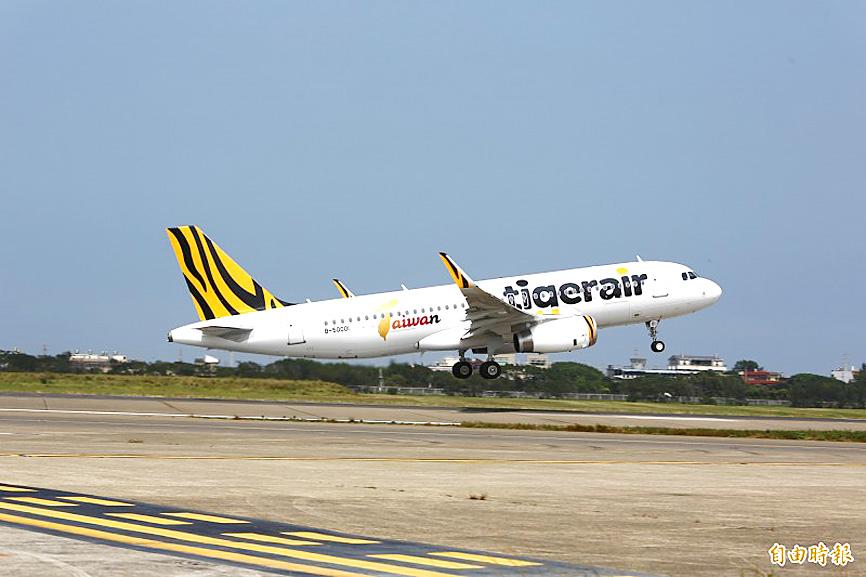Tigerair Taiwan Ltd (台灣虎航) has applied to the Taiwan Stock Exchange (TWSE) to list its shares on the main board, hoping to raise more capital before the international travel market recovers next year, the low-cost carrier said yesterday.
Although the airline falls short of the main board’s stricter requirements, as it reported a loss last year amid the COVID-19 pandemic, it should be eligible under relaxed listing rules for companies affected by the pandemic, the exchange told the Taipei Times by telephone.
Under the relaxed rules, the review committee focuses on an applicant’s financial results from every year except for the one affected by COVID-19, the exchange added.

Photo courtesy of Tigerair Taiwan
Tigerair Taiwan reported net profit of NT$981 million (US$35.43 million) in 2018 and NT$808 million in 2019, before reporting net loss of NT$1.37 billion last year.
“The applicant’s financial performance is just one of many factors to be considered. We will focus on its business growth potential,” TWSE spokeswoman Rebecca Chen (陳麗卿) said.
“We will examine the airline’s business plan to see how it has adapted to the pandemic, whose development is difficult to forecast,” Chen said.
Of the firms that have applied under the relaxed rules, not many have been approved, Chen added.
Tigerair Taiwan expects Japan and South Korea, its two main markets, to have less restrictive border controls and quarantine measures after the Lunar New Year holiday, as their vaccination rates continue to rise, spokesperson Bernard Hsu (許致遠) said by telephone.
“Some countries tightened their border controls recently due to the spread of the Omicron variant [of SARS-CoV-2], but we think that was actually good for the aviation industry, as the strict measures will help contain the pandemic,” Hsu said.
“The earlier the countries contain the pandemic, the sooner they will reopen their borders,” he said.
The airline hopes to attract more capital to improve its operation and information system before the international travel market recovers, Hsu said.
The airline issued 120 million new shares in September, raising NT$3 billion, and most of its new shares were bought by its parent company, China Airlines Ltd (CAL, 中華航空), and its affiliate, Mandarin Airlines (華信航空), company data showed.
Tigerair Taiwan would issue new shares if it is approved to be listed on the main board, as CAL and Mandarin hold a combined stake of 81.3 percent in the airline, higher than the limit of 70 percent, Hsu said.
The company used the proceeds raised this year to improve its digital system to do big data analysis, and plans to launch new membership programs and travel programs next year, he said.
It received two Airbus 320neo jets this year and would take delivery of the other two planes next year, reducing the average age of fleet to five year old, a comparatively low number, he added.

China’s Huawei Technologies Co (華為) plans to start mass-producing its most advanced artificial intelligence (AI) chip in the first quarter of next year, even as it struggles to make enough chips due to US restrictions, two people familiar with the matter said. The telecoms conglomerate has sent samples of the Ascend 910C — its newest chip, meant to rival those made by US chipmaker Nvidia Corp — to some technology firms and started taking orders, the sources told Reuters. The 910C is being made by top Chinese contract chipmaker Semiconductor Manufacturing International Corp (SMIC, 中芯) on its N+2 process, but a lack

NVIDIA PLATFORM: Hon Hai’s Mexican facility is to begin production early next year and a Taiwan site is to enter production next month, Nvidia wrote on its blog Hon Hai Precision Industry Co (鴻海精密), the world’s biggest electronics manufacturer, yesterday said it is expanding production capacity of artificial intelligence (AI) servers based on Nvidia Corp’s Blackwell chips in Taiwan, the US and Mexico to cope with rising demand. Hon Hai’s new AI-enabled factories are to use Nvidia’s Omnivores platform to create 3D digital twins to plan and simulate automated production lines at a factory in Hsinchu, the company said in a statement. Nvidia’s Omnivores platform is for developing industrial AI simulation applications and helps bring facilities online faster. Hon Hai’s Mexican facility is to begin production early next year and the

AVIATION BOOM: CAL is to renew its passenger and cargo fleets starting next year on record profits as aviation continues to return to pre-pandemic levels China Airlines Ltd (CAL, 中華航空) yesterday said it is optimistic about next year’s business outlook, as the airline continues to renew its fleet on expectations that global passenger traffic would maintain steady growth and air cargo demand would remain strong. From next year to 2028, the airline is to welcome a new Boeing Co 787 fleet — 18 787-9 and six 787-10 passenger aircraft — to cover regional and medium to long-haul destinations, CAL chairman Hsieh Shih-chien (謝世謙) said at an investors’ conference in Taipei. The airline would also continue to introduce Airbus SE 321neo passenger planes and Boeing 777F cargo jets,

Who would not want a social media audience that grows without new content? During the three years she paused production of her short do-it-yourself (DIY) farmer’s lifestyle videos, Chinese vlogger Li Ziqi (李子柒), 34, has seen her YouTube subscribers increase to 20.2 million from about 14 million. While YouTube is banned in China, her fan base there — although not the size of YouTube’s MrBeast, who has 330 million subscribers — is close to 100 million across the country’s social media platforms Douyin (抖音), Sina Weibo (新浪微博) and Xiaohongshu (小紅書). When Li finally released new videos last week — ending what has